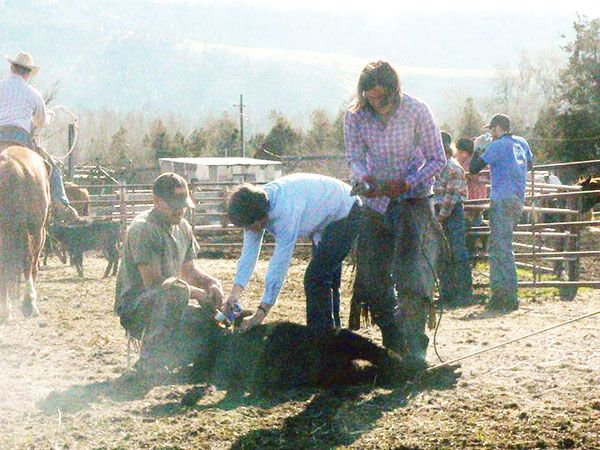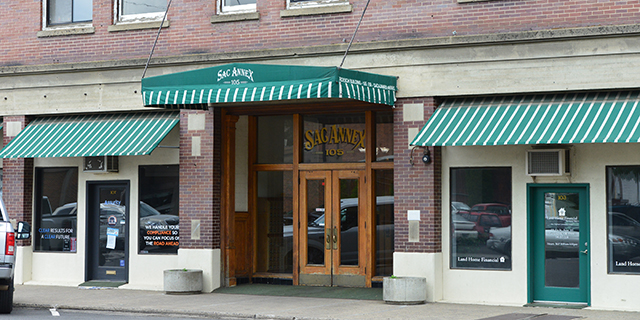Family opens ranch to guests
Published 9:16 am Wednesday, November 6, 2013

- Marcie Sheehy and her daughter, Carrie Hermens, brand cattle with their family and neighbors. This spring, they will open up a Wallowa ranch house to guests looking for an authentic ranch experience. (KATY NESBITT/The Observer)
WALLOWA – The Wallowa County ranching lifestyle may not seem extraordinary to most rural dwellers, but to those in urban areas, life on a working ranch could be intriguing enough to travel to Eastern Oregon for a taste of it for themselves.
For many years, the local 4-H Extension office has partnered with Sunnyside Elementary in Portland, bringing in city kids to spend a weekend feeding cows, checking calves and trailing cattle. The Sheehy and Hermens families of Wallowa have a similar idea of attracting urbanites to the country for a few days to get their hands dirty and sun on their face.
Last spring, the two families leased the Diamond Prairie Ranch, which sits at the foothills of the Wallowas just as the Wallowa River makes its way into the canyon heading west. The Sheehys and Hermens were looking for cattle and sheep pasture when they rented the ranch, but it came with a farmhouse built in 1901.
Carrie Hermens started dreaming about what to do with the house.
“We didn’t need to live in it, so I started thinking of ways to put it to use,” she said.
Hermens got the idea from traveling abroad and from Scottie Jones, a woman in Alsea who started Farm Stay U.S., an Oregon-based company focused on developing a network of working farms and ranches around the U.S. that offer overnight accommodations for travelers.
A little paint and some minor repairs and Hermens and her mother, Marcie Sheehy, said the ranch house could be ready by April 1.
The agreement with the county is for the families to provide lodging for guests who would participate in farming and ranching activities. The conditional-use permit granted by the planning commission allows up to five unrelated persons to stay in the house.
A farm stay is an unusual usefor a ranch, so Planning Director Harold Black looked into it.
Black said he contacted the Benton County planning director, where Jones runs her Leaping Lamb Farm Stay.
“He emailed me their findings for conditionally permitted activities in an (Exclusive Farm Use) zone,” Black said. “The state has some revised statutes for agritourism, but the uses address events, not people coming to the farm.”
Hermens said she sees it to be a boarding and educational experience for those who want to learn more about ranching.
“There can be contentious points urban people are worried about, so it’s a way to open a dialog and make it a positive thing,” Hermens said.
Unlike a bed and breakfast, guests will be on their own to make their meals, but will be welcome to join the families as they go about their day-to-day work on the ranch.
Neighbors Amy Lou and Norman Werst sent a letter of support to the planning commission as well as the ranch’s owner, James
Smekjal.
“I think it’s a positive thing and beneficial since more and more people don’t understand where their food comes from,” said Ken Wick, planning commission chairman.
Hermens said there are only two or three farm stays in Oregon and the others are more like dude ranches.
“This is done all over the world, but not so much in the U.S. She said Leaping Lamb is booked all the time and allows for a real-farm experience, much as she would like to offer.
Black said when the Rural Design Assistance team put out a document on economic development one aspect it listed was to promote the county as a campus and educate people as to what rural life is like.
Commission member Ramona Phillips said she has hosted students from Portland through the 4-H exchange program and thought the farm stay would be a benefit to the county as well as guests.
Hermens said her family started leasing the ranch this year.
“All summer I’ve been mowing lawn and thinking about this historic, beautiful place and how we could share it,” Hermens said. “We run cattle and grow hay and would like to communicate with people who have no experience and don’t have the opportunity to go to a ranch, especially one this beautiful, and meet a ranch family and be a part of it.”
She said she sees it to be different than a dude ranch because they run an authentic, modern ranching operation.
“It’s not a huge corporation, not even a huge ranch. It’s a normal size for Wallowa County, a size of ranch that is dying out in the U.S,” she said. “I hope to have a lot of informal discussions and find out what the guests are interested in about first-hand knowledge of agriculture. It’s a way to get our story out there. Everyone else is good at getting their story out, like environmentalists.”









